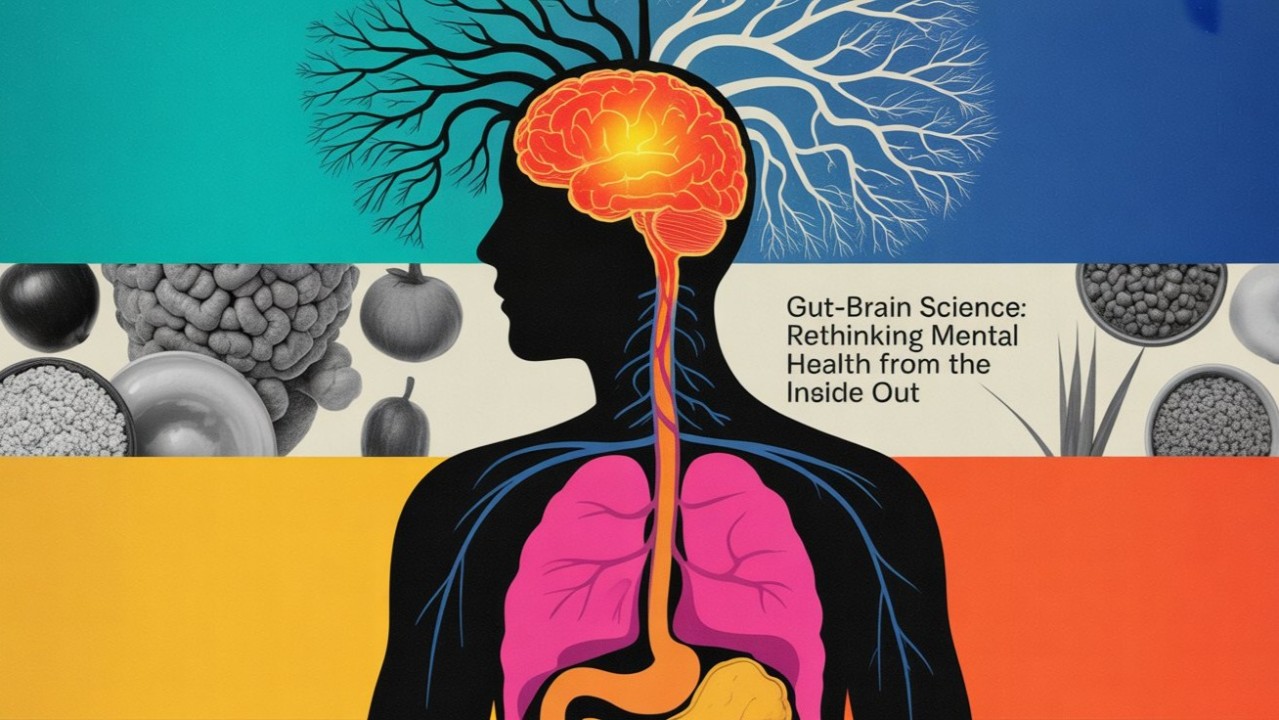The concept that our gut and brain are deeply connected is no longer speculative—it’s now a cornerstone of biomedical research. The gut–brain axis, a bidirectional communication network linking the gastrointestinal tract with the central nervous system, is increasingly understood to be regulated by the trillions of microbes residing in our gut microbiota (Cryan & Dinan, 2012; Mayer et al., 2014).
These microbes play far more than a digestive role. They modulate immune signaling, influence neurotransmitter levels, regulate stress responses, and even affect brain structure and function (Morais et al., 2021; Margolis et al., 2021). Their metabolites, such as short-chain fatty acids and tryptophan derivatives, act as chemical messengers between the gut and the brain.
Animal studies have demonstrated that manipulating the microbiota can alter behavior and emotional processing. For example, ingestion of Lactobacillus rhamnosus significantly altered GABA receptor expression and reduced anxiety- and depression-like behaviors in mice—but only when the vagus nerve was intact (Bravo et al., 2011). Similarly, Bercik et al. (2011) showed that microbiota composition directly affects levels of brain-derived neurotrophic factor (BDNF), a key molecule in mood regulation and neuroplasticity.
Other work has linked the microbiota to the blood–brain barrier: germ-free mice exhibit increased permeability, which normalizes after microbial colonization (Braniste et al., 2014). This opens doors for understanding neuroinflammatory and neurodevelopmental disorders from a gut-centered perspective.
Gut microbiota dysbiosis has been implicated in numerous neuropsychiatric and neurodegenerative disorders, such as depression, autism spectrum disorder, and Parkinson’s disease. Among these, depression has received particular attention, with evidence showing that alterations in the gut microbiome may directly influence mood and behavior through the gut–brain axis. This has driven interest in “psychobiotics”—microbial-based therapies aimed at improving mental health by restoring microbiome balance (Long-Smith et al., 2020; Hsiao et al., 2013). Supporting this connection, experimental studies demonstrate that transferring gut microbiota from depressed individuals to animal models can induce depression-like symptoms, suggesting a causal link. Moreover, Mendelian randomization analyses have identified specific bacterial genera, including Bifidobacterium and Ruminococcus, as potentially protective against depression, while other taxa such as members of the Streptococcaceae family may increase vulnerability (Chen et al., 2022; Kelly et al., 2016; Liu et al., 2024).
As the gut–brain connection continues to gain attention, multi-omics and systems biology approaches are pushing the field forward, offering deep insights into how host–microbe interactions shape our mental and neurological health (Sasso et al., 2023).
Takeaway: The microbiota–gut–brain axis is not just a scientific curiosity—it’s a growing framework for understanding and treating complex brain disorders through the lens of microbial ecology.
REFERENCES
Bercik, P., Denou, E., Collins, J., Jackson, W., Lu, J., Jury, J., Deng, Y., Blennerhassett, P., Macri, J., McCoy, K. D., Verdu, E. F., & Collins, S. M. (2011). The intestinal microbiota affect central levels of brain-derived neurotropic factor and behavior in mice. Gastroenterology, 141(2), 599–609.e3. https://doi.org/10.1053/j.gastro.2011.04.052
Braniste, V., Al-Asmakh, M., Kowal, C., Anuar, F., Abbaspour, A., Tóth, M., Korecka, A., Bakocevic, N., Ng, L. G., Kundu, P., Gulyás, B., Halász, J., Markus, M. A., Risérus, U., Bakocevic, N., Pettersson, S., & Pettersson, J. (2014). The gut microbiota influences blood–brain barrier permeability in mice. Science Translational Medicine, 6(263), 263ra158. https://doi.org/10.1126/scitranslmed.3009759
Bravo, J. A., Forsythe, P., Chew, M. V., Escaravage, E., Savignac, H. M., Dinan, T. G., Bienenstock, J., & Cryan, J. F. (2011). Ingestion of Lactobacillus strain regulates emotional behavior and central GABA receptor expression in a mouse via the vagus nerve. Proceedings of the National Academy of Sciences, 108(38), 16050–16055. https://doi.org/10.1073/pnas.1102999108
Chen, M., Xie, C., Shi, Y., Tang, T., & Zheng, H. (2022). Gut microbiota and major depressive disorder: A bidirectional Mendelian randomization.. Journal of affective disorders. https://doi.org/10.1016/j.jad.2022.08.012.
Cryan, J. F., & Dinan, T. G. (2012). Mind-altering microorganisms: The impact of the gut microbiota on brain and behaviour. Nature Reviews Neuroscience, 13(10), 701–712. https://doi.org/10.1038/nrn3346
Hsiao, E. Y., McBride, S. W., Hsien, S., Sharon, G., Hyde, E. R., McCue, T., Codelli, J. A., Chow, J., Reisman, S. E., Petrosino, J. F., Patterson, P. H., & Mazmanian, S. K. (2013). Microbiota modulate behavioral and physiological abnormalities associated with neurodevelopmental disorders. Cell, 155(7), 1451–1463. https://doi.org/10.1016/j.cell.2013.11.024
Kelly, J., Borre, Y., O’ Brien, C., Patterson, E., Aidy, S., Deane, J., Kennedy, P., Beers, S., Scott, K., Moloney, G., Hoban, A., Scott, L., Fitzgerald, P., Ross, P., Stanton, C., Clarke, G., Cryan, J., & Dinan, T. (2016). Transferring the blues: Depression-associated gut microbiota induces neurobehavioural changes in the rat.. Journal of psychiatric research, 82, 109-18 . https://doi.org/10.1016/j.jpsychires.2016.07.019.
Liu, P., Liu, Z., Wang, J., Wang, J., Gao, M., Zhang, Y., Yang, C., Zhang, A., Li, G., Li, X., Liu, S., Liu, L., Sun, N., & Zhang, K. (2024). Immunoregulatory role of the gut microbiota in inflammatory depression. Nature Communications, 15. https://doi.org/10.1038/s41467-024-47273-w.
Long-Smith, C., O’Riordan, K. J., Clarke, G., Stanton, C., Dinan, T. G., & Cryan, J. F. (2020). Microbiota–gut–brain axis: New therapeutic opportunities. Annual Review of Pharmacology and Toxicology, 60, 477–502. https://doi.org/10.1146/annurev-pharmtox-010919-023628
Margolis, K. G., Cryan, J. F., & Mayer, E. A. (2021). The microbiota–gut–brain axis: From motility to mood. Gastroenterology, 160(5), 1486–1501. https://doi.org/10.1053/j.gastro.2020.10.066
Mayer, E. A., Knight, R., Mazmanian, S. K., Cryan, J. F., & Tillisch, K. (2014). Gut microbes and the brain: paradigm shift in neuroscience. The Journal of neuroscience : the official journal of the Society for Neuroscience, 34(46), 15490–15496. https://doi.org/10.1523/JNEUROSCI.3299-14.2014
Morais, L. H., Schreiber, H. L., & Mazmanian, S. K. (2021). The gut microbiota–brain axis in behavior and brain disorders. Nature Reviews Microbiology, 19(4), 241–255. https://doi.org/10.1038/s41579-020-00460-0
Sasso, J. M., Schroeder, B. O., Klose, C. S. N., & Sonnenburg, J. L. (2023). Gut microbiome–brain alliance: A landscape view into mental and gastrointestinal health and disorders. ACS Chemical Neuroscience, 14(3), 280–290. https://doi.org/10.1021/acschemneuro.3c00127

